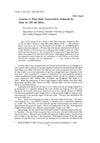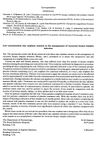72 citations,
October 1992 in “Archives of Dermatology” Recognizing certain rashes can lead to earlier cystic fibrosis diagnosis and better outcomes.
46 citations,
September 2011 in “British journal of dermatology/British journal of dermatology, Supplement” Effective dandruff treatment requires delivering antifungal agents to the scalp follicular infundibulum.
 13 citations,
August 2020 in “Journal of Laparoendoscopic & Advanced Surgical Techniques”
13 citations,
August 2020 in “Journal of Laparoendoscopic & Advanced Surgical Techniques” Biotin supplements are generally ineffective in preventing hair loss after sleeve gastrectomy.
 10 citations,
May 1986 in “Experientia”
10 citations,
May 1986 in “Experientia” Too much zinc in the diet can cause hair loss and color change in young mice by reducing copper in the body.
 9 citations,
September 2018 in “Clinical, Cosmetic and Investigational Dermatology”
9 citations,
September 2018 in “Clinical, Cosmetic and Investigational Dermatology” One supplement improved hair loss and quality faster and more effectively than the other in treating telogen effluvium.
 4 citations,
January 1992 in “The Tohoku Journal of Experimental Medicine”
4 citations,
January 1992 in “The Tohoku Journal of Experimental Medicine” Zinc made mice's coarse hair turn into fine hair without affecting skin structure.
 1 citations,
March 2014 in “Senses and Sciences”
1 citations,
March 2014 in “Senses and Sciences” A supplement with Serenoa repens improved hair loss in a patient.
 June 2024 in “British Journal of Dermatology”
June 2024 in “British Journal of Dermatology” Vitamin B supplements may reverse grey hair.
 38 citations,
January 2015 in “Journal of Cosmetic Dermatology”
38 citations,
January 2015 in “Journal of Cosmetic Dermatology” The nutritional supplement improved hair density and reduced hair loss in women with female pattern hair loss.
 37 citations,
March 2014 in “Journal of Trace Elements in Medicine and Biology”
37 citations,
March 2014 in “Journal of Trace Elements in Medicine and Biology” Lower hair zinc and copper levels found in Turkish males with hair loss; higher BMI linked to less hair zinc.
 33 citations,
April 2009 in “Clinical and Experimental Dermatology”
33 citations,
April 2009 in “Clinical and Experimental Dermatology” Psychological factors like depression may be more important than zinc, folate, and vitamin B12 levels in causing scalp pain in people with hair loss.
 21 citations,
September 2017 in “Journal of Obstetrics and Gynaecology Research”
21 citations,
September 2017 in “Journal of Obstetrics and Gynaecology Research” Chromium supplements don't improve insulin, hormone levels, or cholesterol in women with PCOS but raise testosterone levels.
 19 citations,
July 2015 in “Journal of inherited metabolic disease”
19 citations,
July 2015 in “Journal of inherited metabolic disease” Methionine restriction works better than betaine for treating CBS deficiency symptoms in mice.
 11 citations,
April 2018 in “Nutrition Research”
11 citations,
April 2018 in “Nutrition Research” Chromium supplements don't help with weight loss or improve hormone and metabolism issues in people with polycystic ovary syndrome.
 11 citations,
September 2007 in “Advances in therapy”
11 citations,
September 2007 in “Advances in therapy” INVERSION Femme supplement helped women lose weight, reduce hair loss, and improve skin and nail health.
 10 citations,
January 2012 in “International Journal of Trichology”
10 citations,
January 2012 in “International Journal of Trichology” The study found no link between anxiety, vitamin B12, folate, TSH, ferritin, zinc levels, and trichodynia in telogen alopecia patients.
 9 citations,
July 2020 in “Journal of Animal Physiology and Animal Nutrition”
9 citations,
July 2020 in “Journal of Animal Physiology and Animal Nutrition” Melatonin given to pregnant rabbits improved their babies' fur quality.
 3 citations,
January 2017 in “Journal of cosmetology & trichology”
3 citations,
January 2017 in “Journal of cosmetology & trichology” The food supplement with L-cystine, Serenoa repens extract, and biotin safely reduced hair loss and improved hair growth in men and women.
 3 citations,
January 1985 in “British Journal of Dermatology”
3 citations,
January 1985 in “British Journal of Dermatology” Zinc sulphate solution was not effective in reducing the number, duration, or severity of recurrent herpes simplex infections.
 January 2018 in “International journal of food and nutrition research”
January 2018 in “International journal of food and nutrition research” Intermittent iron and nutritional supplements can help reduce hair loss.
 January 2024 in “Biological trace element research”
January 2024 in “Biological trace element research” Isotretinoin affects trace element levels and requires monitoring of liver and kidney functions.
 April 2023 in “Acta Poloniae Pharmaceutica”
April 2023 in “Acta Poloniae Pharmaceutica” Herbal extract shampoo increased certain minerals in hair and improved hair growth and scalp health.
 25 citations,
August 2016 in “Journal of Cosmetic Dermatology”
25 citations,
August 2016 in “Journal of Cosmetic Dermatology” The marine complex supplement significantly improved hair growth in men with thinning hair without adverse effects.
 16 citations,
March 2007 in “The Veterinary clinics of North America. Food animal practice”
16 citations,
March 2007 in “The Veterinary clinics of North America. Food animal practice” Proper mineral supplementation in cow-calf operations prevents health issues and economic losses.
 4 citations,
January 2016 in “Dermatology online journal”
4 citations,
January 2016 in “Dermatology online journal” Using bacitracin zinc and selenium sulfide one after the other can temporarily turn white hair yellow.
 1 citations,
August 2004 in “Alternative & complementary therapies”
1 citations,
August 2004 in “Alternative & complementary therapies” Non-drug methods like diet, supplements, and aromatherapy can help manage hair loss and its emotional impact.
 78 citations,
December 2011 in “Clinical toxicology”
78 citations,
December 2011 in “Clinical toxicology” Excessive selenium from a supplement caused toxicity but patients recovered with care.
 1 citations,
February 2021 in “Animal feed science and technology”
1 citations,
February 2021 in “Animal feed science and technology” Organic selenium may offer better retention and less waste in puppies.
 December 2021 in “Trichology and cosmetology:”
December 2021 in “Trichology and cosmetology:” Taking Kera-Diet® improves hair and nail health without side effects.
 195 citations,
April 2005 in “Journal of biological chemistry/The Journal of biological chemistry”
195 citations,
April 2005 in “Journal of biological chemistry/The Journal of biological chemistry” The ZIP7 gene helps control zinc levels in cells by moving zinc from the Golgi apparatus to the cytoplasm.



























